

Digital Badges principles and standards rubric 9 21 2015 500427 7. Elib1503. Badges. Open Badges in Higher Education (OBHE) is funded through the MacArthur Foundation’s Digital Media and Learning Initiative to support the development and implementation of open digital badges and related forms of web-enabled digital credentials in higher education.
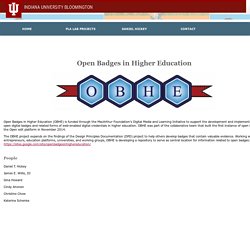
OBHE was part of the collaborative team that built the first instance of open badges in the Open edX platform in November 2014. The OBHE project expands on the findings of the Design Principles Documentation (DPD) project to help others develop badges that contain valuable evidence. Working with entrepreneurs, education platforms, universities, and working groups, OBHE is developing a repository to serve as central location for information related to open badges: People Daniel T. James E. Gina Howard Cindy Ahonen Christine Chow Katerina Schenke. Karen%20Jeffrey%20presentation%20CNUSD%202015. Passport To Success / Digital Badge Summer Institutes. Badge Chain. Untitled. The Attribution Theory In eLearning: Types, Dimensions And Stages. WhatCountsAsLearning Grant. The Next Experiment in Education.
Correction appended, April 14 “Sit and Get.”
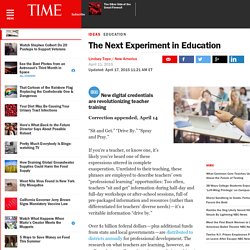
“Drive By.” “Spray and Pray.” If you’re a teacher, or know one, it’s likely you’ve heard one of these expressions uttered in complete exasperation. Unrelated to their teaching, these phrases are employed to describe teachers’ own “professional learning” opportunities: Too often, teachers “sit and get” information during half-day and full-day workshops or after-school sessions, full of pre-packaged information and resources (rather than differentiated for teachers’ diverse needs) — it’s a veritable information “drive by.” Over $1 billion federal dollars — plus additional funds from state and local governments — are distributed to districts annually for professional development. Given how little is currently known about the impact of professional learning opportunities, micro-credentialing could be a path forward for driving transparency and, in the long term, improving the quality of teacher learning opportunities.
More from New America: Can Digital Badges Save Hebrew School? Jewish Teachers' New Gamifying Technology By David A.M.
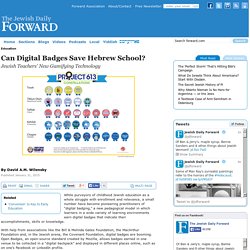
Wilensky Published January 31, 2015. While purveyors of childhood Jewish education as a whole struggle with enrollment and relevance, a small number have become pioneering practitioners of “digital badging,” a new pedagogical model in which learners in a wide variety of learning environments earn digital badges that indicate their accomplishments, skills or knowledge. With help from associations like the Bill & Melinda Gates Foundation, the MacArthur Foundation and, in the Jewish arena, the Covenant Foundation, digital badges are booming. “There are now international conferences looking at how to use badging in education, but Jewish education has serendipitously become a real leader in this field,” said Sam Abramovich, a professor of education informatics at Buffalo University.
Much of what is learned has traditionally gone unassessed. That’s exactly what they did at The Epstein School, a Jewish day school in Atlanta. Use of ‘digital badges’ in schools would motivate students, research shows. BUFFALO, N.Y. – The blend of digital technology and traditional merit badges, such as those earned by Boy and Girl Scouts, would provide an opportunity to both motivate and measure learning, according to new research by University at Buffalo education professor Sam Abramovich.
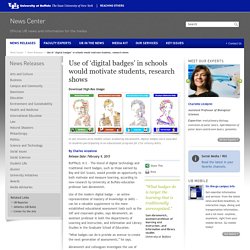
Use of the modern digital badge — an online representation of mastery of knowledge or skills — can be a valuable supplement to the more established educational assessment tools such as the SAT and classroom grades, says Abramovich, an assistant professor in both the departments of Learning and Instruction, and Information and Library Studies in the Graduate School of Education. “What badges can do is provide an avenue to create the next generation of assessments,” he says. OBIE 2015 : 2nd International Workshop on Open Badges in Education: From Learning Evidence to Learning Analytics. CALL FOR PAPERS - EXTENDED SUBMISSION DEADLINE (January 23) 2nd International Workshop on Open Badges in Education (OBIE 2015): From Learning Evidence to Learning Analytics - - =) in conjunction with the 5th International Learning Analytics and Knowledge Conference (LAK'15), Poughkeepsie, New York, USA, March 16-20, 2015 ( IMPORTANT DATES ==================================== * 23 January 2015: Paper submission deadline (EXTENDED) * 02 February 2015: Notification of acceptance * 16 February 2015: Camera-ready paper * 16 March 2015: OBIE2015 Workshop.
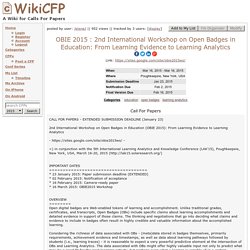
Online Courses Experiment With Digital Badges. When 48-year-old Reginald Nichols of Reading, Massachusetts, took a free massive open online course in leadership last year, he wasn't expecting to earn credit for a certificate or degree.
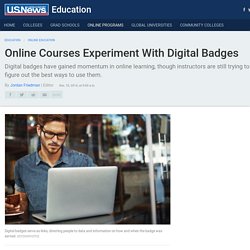
Instead, after turning in several assignments and receiving positive peer reviews from other students, he earned what looked like an image of a badge – a blue one with a green border and, written across the bottom, the name of the course and the year: LeaderMOOC 2013. It indicates his successful completion of the program, offered by the Center for Creative Leadership, a nonprofit specializing in executive education. "It was my first digital badge," says Nichols, an academic counselor at Middlesex Community College in Massachusetts who pursued the badge for both personal fulfillment and professional knowledge. "It’s something I’m definitely proud of. "
Badges for Professional Development. Badges for Educators. Digital Tools. Teaching Resources. Badges and Learning. Digital Badges in Action (Kids) Resources (Compilations, Web Pages...) Tech Stuff. Badge Making Systems. Badge-ophilia. Badges for Professionals. Interesting Articles.